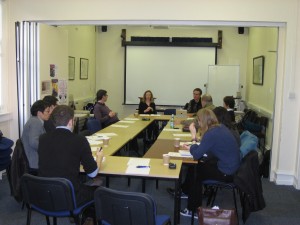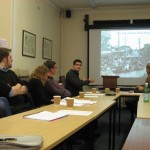New Directions in Chinese Urban Studies, Centre for Urban History, University of Leicester, Monday 17 December 2012

Workshop participants, 17 December 2012, Leicester
This was the first in a series of workshops that will explore the state of Chinese urban history, identify recent developments in the field and explore new approaches and directions. In her opening remarks, Isabella Jackson raised some possible points for wider discussion, including the wealth of research on Shanghai compared with other cities in China, the possibility of linking urban history with the rapidly growing literature on Chinese urban studies, and whether the field is merely engaging with debates that have occupied scholars of the West for years or has a new perspective to offer.
Two general papers that reviewed the state of the field then followed. Christian Henriot discussed the continuing emphasis on Shanghai, and the problems of inserting this into a broader framework of Chinese urban history. He highlighted the problems of language and archival access and that makes it likely that Shanghai will continue to be a focus of study for some time to come. He then turned to the role of digital technologies, such as databases, and online archives, and the need to create platforms for sharing knowledge and data. He described ongoing projects, which included the collection of advertisements from Shanghai newspapers, which will be made available to scholars, and a new collaborative venture that will investigate how war made Shanghai. Turning to urban studies, Hyun Shin discussed its Eurocentric focus, which is largely derived from the global cities literature. Within China, this means that there is a concentration on large coastal cities, most notably Beijing, Shanghai and Guangzhou. Moreover, the role of the party-state remains under-explored, while ideas surrounding the right to the city, and the role of marginalized groups such as migrants also need more research.

Chris Courtney presenting, Leicester December 2012
The workshop then moved on to consider case studies from the first half of the twentieth century. Wang Min introduced her current research on the treaty port of Shanghai. Through an analysis of the Feetham report, she highlighted the diplomatic interplay between the British state, the Shanghai Municipal Council and the Chinese government at a crucial time of upheaval and crisis that threatened the International settlement during the 1920s. The response of the Chinese and British governments and community illustrate how the history of Shanghai concerns the city itself, but also incorporates wider narratives of Chinese nationalism and the relationship of China to Western Imperialism. Moving one hundred miles inland, Toby Lincoln turned to the city of Wuxi, and the interaction of local elites with the emerging modernizing state. He argued that attempts to construct municipal autonomy in the early 1920s illustrate how the state was perceived as an important source of power. However, the fact that during the Jiangsu-Zhejiang war it was social organizations that were responsible for urban management points to the weakness of the state in this period. State-society interactions were also important to Chris Courtney’s paper on the 1931 Wuhan flood. He argued that the construction of competing narratives surrounding the relationship between the destruction of the Dragon King Temple and the causes of the flood illustrate that while local opinion may have sought spiritual reasons for the disaster, this was utilized by local elites to disrupt further state plans for urban development.
The final panel moved the discussion into the early PRC period, and Jon Howlett showed how the development of Communism in the city was often gradual and contingent. Through an analysis of changing street names in Shanghai, he illustrated that some areas of the city were almost forgotten by the party, and that requests from residents in the late 50s and 60s forced the change, rather than central or even municipal directives. The difficulties of building the revolution in the city were similarly the focus of Karl Gerth’s paper on consumption in Shanghai. Advertising was common throughout the early 1950s, and this points to the continuation of an urban culture that is more often associated with the pre-war period. Moreover, the notion of socialist shopping illustrates some of the ideological compromises that had to be made by the CCP.
The final roundtable returned to some of the key themes of Chinese urban history. Shanghai and its position within the field dominated the discussion, which also touched on whether the study of the city in China is emerging as a sub-discipline within its own right. Participants also commented on the fact that many common themes exist in urban history and urban studies, and that as the Maoist period and the Cultural Revolution become history, perhaps it is time to join the two fields together in a more coherent way.
By Emily Whewell, PhD Candidate, University of Leicester
 I received my BICC scholarship in 2006 and I was awarded my PhD from the University of Bristol in 2012. I now work as Lecturer in Modern Asian History at the University of York, a job which I came to in the autumn of 2012 after completing a one-year teaching fellowship at Newcastle University. In hindsight, being awarded a BICC scholarship was a crucial step in my development as an historian of modern China and in enhancing my career prospects because it allowed for two years of study at the University of Oxford before I commenced my PhD research in which I developed essential language skills.
I received my BICC scholarship in 2006 and I was awarded my PhD from the University of Bristol in 2012. I now work as Lecturer in Modern Asian History at the University of York, a job which I came to in the autumn of 2012 after completing a one-year teaching fellowship at Newcastle University. In hindsight, being awarded a BICC scholarship was a crucial step in my development as an historian of modern China and in enhancing my career prospects because it allowed for two years of study at the University of Oxford before I commenced my PhD research in which I developed essential language skills.

